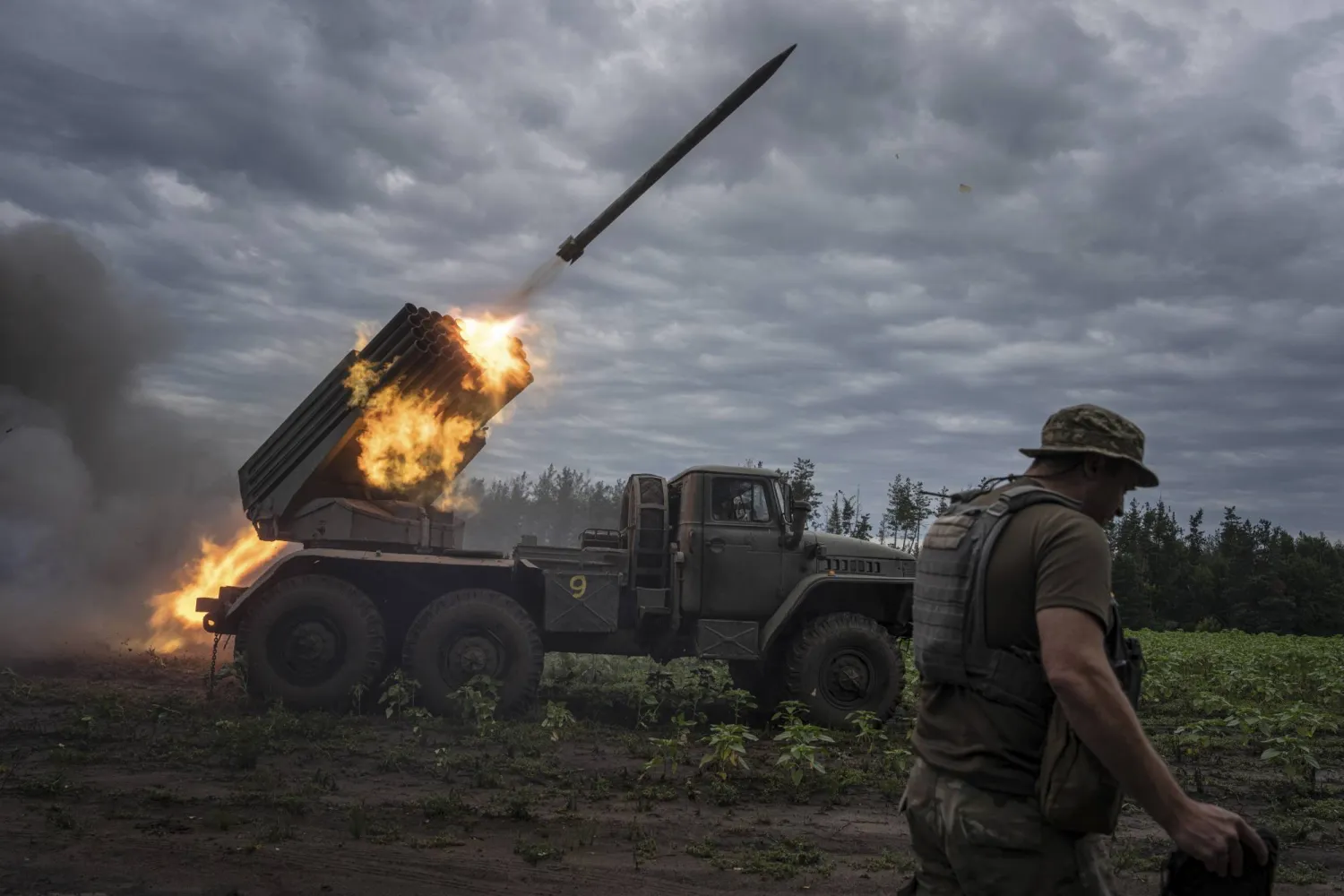A Russian ballistic missile with cluster munitions struck a residential area of a northern Ukraine city, killing 11 people including two children and injuring 84 others, officials said Monday.
The two children killed in the strike on Sumy late Sunday were a 9-year-old boy and a 14-year-old girl, the regional prosecutor’s office said. Six injured children are in critical condition, it said.
The attack damaged 15 buildings, including two educational facilities, the prosecutor’s office said. A search and rescue operation continued Monday, on the eve of the war’s 1,000-day milestone.
Sumy lies 40 kilometers (24 miles) from the Russian border, The Associated Press said/
Also Sunday, US President Joe Biden authorized for the first time the use of US-supplied longer-range missiles by Ukraine to strike inside Russia, after extensive lobbying by Ukrainian officials.
The weapons are likely to be used in response to North Korea’s decision to send thousands of troops to support Russia in the Kursk region where Ukraine mounted a military incursion over the summer.
It is the second time the US has permitted the use of Western weapons inside Russian territory within limits after permitting the use of HIMARS systems, a shorter-range weapon, to stem Russia’s advance in Ukraine’s Kharkiv region in May.
The first reaction from Ukraine to the long-awaited decision from the US was notably restrained.
“Today, much is being said in the media about us receiving permission for the relevant actions. But strikes are not made with words. Such things are not announced. The missiles will speak for themselves,” Ukrainian President Volodymyr Zelenskyy said in his nightly video address.
Earlier, Zelenskyy said that Russia had launched a total of 120 missiles and 90 drones in a large-scale attack across Ukraine, including Sumy. Russia deployed various types of drones, he said, including Iranian-made Shaheds, as well as cruise, ballistic and aircraft-launched ballistic missiles.
The attack, which targeted Ukraine’s energy infrastructure, came as fears are mounting about Moscow’s intentions to devastate Ukraine’s power generation capacity ahead of the winter.
Ukrainian defenses shot down 144 out of a total of 210 air targets, Ukraine’s air force reported.
“The enemy’s target was our energy infrastructure throughout Ukraine. Unfortunately, there is damage to objects from hits and falling debris. In Mykolaiv, as a result of a drone attack, two people were killed and six others were injured, including two children,” Zelenskyy said.
Two more people were killed in the Odesa region, where the attack damaged energy infrastructure and disrupted power and water supplies, said local Gov. Oleh Kiper. Both victims were employees of Ukraine’s state-owned power grid operator, Ukrenergo, the company said hours later.
The combined drone and missile attack was the most powerful in three months, according to the head of Kyiv’s City Military Administration, Serhii Popko.
One person was injured after the roof of a five-story residential building caught fire in Kyiv’s historic center, according to Popko.
A thermal power plant operated by private energy company DTEK was “seriously damaged,” the company said.
Russian strikes have hammered Ukraine’s power infrastructure since Moscow’s all-out invasion of its neighbor in February 2022, prompting repeated emergency power shutdowns and nationwide rolling blackouts. Ukrainian officials have routinely urged Western allies to bolster the country’s air defenses to counter assaults and allow for repairs.
Russia’s Defense Ministry on Sunday acknowledged carrying out a “mass” missile and drone attack on “critical energy infrastructure” in Ukraine, but claimed all targeted facilities were tied to Kyiv’s military industry.
Although Ukraine’s nuclear plants were not directly impacted, several electrical substations on which they depend suffered further damage, the UN’s nuclear energy watchdog said in a statement Sunday. According to the International Atomic Energy Agency, only two of Ukraine’s nine operational reactors continue to generate power at full capacity.
The Russian military said Monday it intercepted and destroyed 59 Ukrainian drones overnight over several Russian regions. Two were downed over the Moscow region that surrounds the Russian capital, and three others over the neighboring Tula region. A total of 54 drones were destroyed over the Bryansk, Kursk and Belgorod regions on the border with Ukraine, according to a statement by the Russian Defense Ministry.
Moscow Mayor Sergei Sobyanin said the drones shot down outside of Moscow were heading toward the capital.
A Russian Ballistic Missile with Cluster Munitions Kills 11 People and Injures 84 in Ukraine's North

FILE - Ukrainian forces shoot toward Russian positions at the front line in Kharkiv region, Ukraine, on Tuesday, Aug. 2, 2022. (AP Photo/Evgeniy Maloletka, File)

A Russian Ballistic Missile with Cluster Munitions Kills 11 People and Injures 84 in Ukraine's North

FILE - Ukrainian forces shoot toward Russian positions at the front line in Kharkiv region, Ukraine, on Tuesday, Aug. 2, 2022. (AP Photo/Evgeniy Maloletka, File)
لم تشترك بعد
انشئ حساباً خاصاً بك لتحصل على أخبار مخصصة لك ولتتمتع بخاصية حفظ المقالات وتتلقى نشراتنا البريدية المتنوعة







